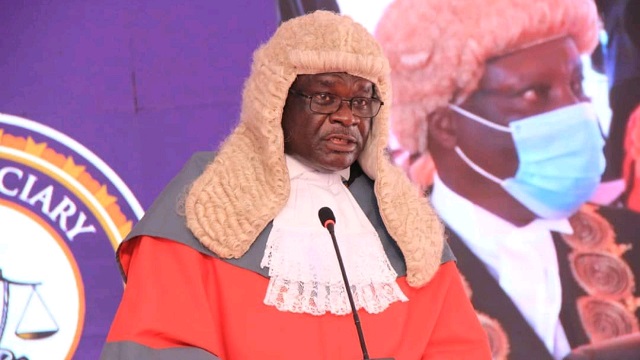
Chief Justice Owiny Dollo is on the test as expected today to lead a panel of Supreme Court Justices to deliver an overwhelmingly awaited judgement which will give or stop the army court from prosecuting criminal cases that involve civilians.
A number of lawyers and members of the public, this website talked to before the announcement of the Supreme Court verdict reveals that all their eyes are on Justice Dollo and his learned sister Elizabeth Musoke with whom they formed a penal at the Court of Appeal that declare the army court lacks jurisdiction to trial cases involving civilian and their judgement was never appealed against.
The Chief Justice, Dollo, Musoke together with their learned brother Cheborione Barishaki in 2020 ruled that the Army Court has no powers to entertain all cases.
The court of appeal declared the General Court Martial quasi judicial advising it to stay in their line of handling cases listed in the UPDF Act which established it.
The court decision now puts Justice Dollo on test to overturn his own decision which was never appealed.
A section of the public says that the chief justice ought to have come out and guided the ongoing debate regarding the trial of opposition leader Dr Kizza Besigye and his friend Haji Obed Lutale.
The duo is accused of attempting to overthrow the Museveni government.
The 2020 Court of Appeal decision was made in the case of Lt Col John Kaye who was released after the decisions of the army court were quashed.
Lt Col Kaye through their lawyers led by Caleb Alaka were challenging the decision of the UPDF army Appeals Court which sentenced the convict to seven years imprisonment on charges of manslaughter which he committed in 2015.
“Court made a finding that murder was not a service offence, so it could not be tried by General Court Martial. Accordingly the proceedings in the Court Martial of Appeals were declared unconstitutional, as it was illegal for having been exercised without jurisdiction. In our view since the trial of the murder was illegal” justice Dollo’s judgement reads.
Based on the above decision, lawyers insist that they respect Dollo and Musoke, justices of the Supreme Court to stand on their ground defending the decision they made when still serving at the Court of Appeal because it was not appealed against.
Kampala Lord Mayor Ssalongo Erias Lukwago who is also one of the lawyers representing veteran politician Dr Kizza Besigye who is faces trial at army court confirms that the tensions are high explaining that Justice Dollo’s supreme court decision is the only hope the have to save his client and many innocent Ugandans who are suffering injustices from the army court.
Kira Municipality legislator Ibrahim Ssemujju Nganda said that if court declares that army court has powers to try civilians, it means many Ugandans including petitioner in the constitutional appeal before Justice Dollo penal former legislator Micheal Kabaziguruka will be taken back to prison and the army court proceeded with their trial.
Kabaziguruka was saved by former Court of Appeal justice Remmy Kasule who issued a stay of his prosecution after filing the said Constitutional petition challenging the powers of the army court and won by Attorney General Kiryowa Kiwanuka challenges the decision at the Supreme Court and secured the stay of executing of the decision of the lower court.
However, lawyers in the army and those in the Attorney General’s chambers are also on their knees praying that supreme court should allow them to trial civilians especially those committed offences to soldiers and are basing on the guidance given by president Museveni recently praising the army court for stabilizing the country through handling cases involving civilians.
https://hoimapost.co.ug/chief-justice-owiny-dollo-faces-crucial-test-as-supreme-court-prepares-to-rule-on-army-courts-jurisdiction-over-civilians/